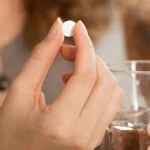PCOS test is based on the Rotterdam criteria for diagnosing PCOS.

Drug Side Effects
PCOS symptoms like facial and body hair and acne are a result of high levels of male hormones. Spironolactone is believed to be effective against excess male hormones. While the drug has been used for more than three decades for PCOS, it comes with certain side effects.
A major embarrassing symptom of PCOS is “hirsutism,” or the sprouting of hair on the face, chest, and stomach. Excess hair growth in PCOS patients is a result of the high levels of male hormones (androgens) in them. For this reason, the pattern of hair growth is similar to that seen in men. Androgens also cause acne. Doctors often prescribe a drug called spironolactone for the treatment for hirsutism in PCOS.
Spironolactone (Aldactone) is a “water pill,” or diuretic that is usually used to reduce swelling due to excess fluid buildup. It is prescribed for diseases like liver cirrhosis, congestive heart failure and nephrotic syndrome (a kidney disorder). This drug also has an androgen-lowering effect on the body, and hence it is prescribed for PCOS symptoms like acne and hirsutism.
The effectiveness of spironolactone to treat moderate to severe hirsutism was reported in 1982. Positive effects were seen within two months of treatment. In 1986, a study was done to assess the efficacy of spironolactone in the treatment of acne in women with PCOS. Spironolactone was found to significantly improve acne by reducing the levels of male hormones.
Spironolactone acts by blocking testosterone receptors as well decreasing the production of testosterone. The drug is a potent antagonist (blocker) of the androgen receptor. It does not allow effective binding of molecules of testosterone to its receptor, and thus stops testosterone from showing its effects on the cells.
Spironolactone causes side effects that can range from minor ones like headaches to serious complications like stomach bleeding.
The most common and recognizable brand is Aldactone. Another brand available in the United States is CaroSpir.
Doctors often prescribe a dosage of 50 – 200 mg per day, either once or divided into two doses, both 12 hours apart. Spironolactone is usually available in tablet form and has to be taken orally.
Lower dosages of this drug are found to cause milder side effects. However, higher dosages are found to be more effective in reducing hirsutism and acne. Your doctor is the best judge to fix the right dosage for you that will be effective as well as not let you experience too many side effects.
Spironolactone has been used for more than three decades for the treatment of PCOS hirsutism and acne. A long term study was done to assess the safety of spironolactone. This study found that there were no serious illnesses or health complications that could be attributed to spironolactone use. Apparently, long-term use of spironolactone is safe. Side effects as mentioned above are a problem but they will disappear once you stop using spironolactone.
Spironolactone is a potassium-sparing diuretic. You shouldn’t be taking this medicine if you are allergic to it or suffer from kidney disease, Addison’s disease (a disorder of the adrenal glands), have high levels of potassium in your body, or are taking a drug called eplerenone.
You should consult with your doctor about the safety of spironolactone if you have a liver or heart disease or an electrolyte imbalance. You should not be taking this medication if you are pregnant, plan to become pregnant or if you are breast feeding a child.
Spironolactone interacts severely with drugs that weaken the immune system, such as cyclosporine and tacrolimus. When taken together, they will cause a sudden increase in potassium levels. Spironolactone also reacts seriously with the following:
Other drugs that interact moderately with spironolactone are
Store the medicine in a clean, dry and tightly closed container. Keep it away from humidity, excess light and heat. Do not refrigerate.
Always store medicines away from young children and pets. Unused and expired medicines should be disposed of in ways that they do not get consumed by pets, children and other people. Never flush the medicines. If you are not sure about the disposal of the medicine, take it back to your pharmacist.
Since this is a potassium-sparing diuretic, you have to limit potassium-rich foods like bananas, raisins, prunes, and orange juice. Ask your doctor how much of these you can safely consume. You need to strictly avoid potassium-containing salt substitutes while you are on this medication. Reduce your salt (sodium) intake during the course of this medication.
Spironolactone has been used for more than 30 years for treating PCOS hirsutism and acne. A few long-term studies do indicate that this drug is safe. However, it is seen that some women do not complete the treatment course due to the side effects. Side effects are troublesome and a serious cause for concern. But they do resolve once you stop the medication. Because this treatment usually runs for more than 6 months, women face the risks of side effects for a long time. This can create a psychological stress on them. Doctors should weigh the costs with the benefits while recommending spironolactone for PCOS.
Don’t wish to deal with the side-effects that come along with the drugs prescribed for PCOD management? Reverse PCOD naturally using a holistic approach with Sepalika’s 5-Petal PCOD Programme. Our personalised protocols help treat PCOD at the root through diet, nutrition, exercise, Ayurveda and magnet acutherapy. What’s more, expert consults via phone and WhatsApp help you always stay on track in your journey to overcome PCOD. Click here to know more.